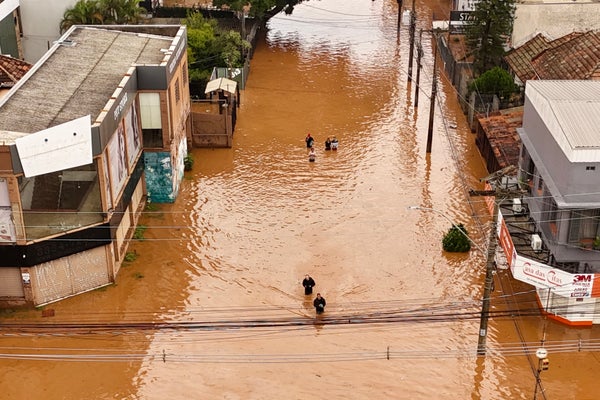
More Climate Lawsuits Than Ever Are Trying to Hold Companies and Countries to Account
At least 230 new climate cases were filed in 2023, but researchers noted the growth of such cases was slower than in prior years

Aerial view of people walking through a flooded street at the Navegantes neighborhood in Porto Alegre, Rio da Grande do State, Brazil on May 4, 2024. More climate lawsuits have been filed in Brazil than in most other nations, according to a new report.
Carlos Fabal/AFP via Getty Images
CLIMATEWIRE | Climate lawsuits against governments and corporations are still on the rise across the globe, but their growth may be slowing, according to new research.
The annual report from the Grantham Research Institute on Climate Change and the Environment at the London School of Economics assessing climate litigation trends found that at least 230 new climate cases were filed in 2023. But report authors Joana Setzer and Kate Higham noted that the number of climate lawsuits expanded less rapidly than in previous years.
They said the trend could suggest “a consolidation and concentration of strategic litigation efforts in areas anticipated to have high impact.”
On supporting science journalism
If you’re enjoying this article, consider supporting our award-winning journalism by subscribing. By purchasing a subscription you are helping to ensure the future of impactful stories about the discoveries and ideas shaping our world today.
Still, climate litigation continued to spread to new countries in 2023, with cases filed for the first time in Panama and Portugal.
Whether the court cases are “advancing or hindering remains difficult to determine,” Setzer and Higham wrote. But they added that some lawsuits have clearly had an impact on climate governance.
Nearly 50 new “climate-washing” cases were filed last year, making it one of the most rapidly expanding areas of litigation. The Grantham Institute has defined climate-washing lawsuits as cases that challenge companies and governments over misinformation or misleading climate claims.
The report notes that the lawsuits have been successful, with more than 70 percent of completed cases decided in favor of the challengers.
Climate litigants have also broadened their targets. Cases against companies have traditionally focused on the fossil fuel sector but are now being launched against airlines, financial services firms, and food and beverage companies, according to the report.
There is also potential for an increase in litigation that challenges governments’ net-zero targets, Setzer and Higham found.
The United States remains the leader in cases filed with 1,745 lawsuits in total — including 129 new cases in 2023. The United Kingdom, Brazil and Germany had the next highest numbers of climate cases.
Setzer and Higham noted that older cases filed in Hungary and Namibia were identified for the first time, bringing the total number of countries in which climate cases have been recorded to 55.
The report also introduces a new category of “transition risk” — cases filed against corporate directors and officers for managing climate risks. The report notes that shareholders at the Polish utility Enea approved a decision to bring such a case against former directors for planned investments in a new coal-fired power plant.
Setzer and Higham also identified six “turning off the taps” cases, which challenge the financing of projects and activities that are not aligned with climate action. Since 2015, 33 such cases have been filed.
But the report notes that not all lawsuits are aligned with tackling climate change. It found that nearly 50 of the more than 230 cases filed in 2023 “appear to be intentionally seeking to use legal tactics to obstruct climate action.”
Those cases included a consumer protection lawsuit from Tennessee Attorney General Jonathan Skrmetti (R) against the investment giant BlackRock. The complaint alleged that Blackrock made false or misleading statements about the extent to which environmental, social and governance factors played a role in the firm’s investment strategies.
The Grantham report said that the ESG backlash in U.S. climate litigation is “out of step in trends elsewhere in the world.”
The report highlighted a Montana court’s landmark ruling last year, which held that the state had violated the rights of young people by failing to consider the climate effects of oil and gas infrastructure.
“The decision could offer a model of the type of scientific arguments and evidence that can be used to overcome hurdles around standing and causation that have previously posed major challenges for similar cases,” the report said, although the authors noted that the ruling was decided on narrow grounds and is on appeal before the Montana Supreme Court.
In a section on “polluter pays” lawsuits in the United States — a category that captures the nearly two dozen lawsuits from local governments seeking compensation from the oil and gas industry for their role in climate change — the reports says it may be “many months, if not years” before trials begin in those lawsuits. But some cases have begun to move into the discovery phase.
Through that process, “thousands of pages of internal documents released to the plaintiffs and the public and may in itself result in significant changes in political debate around the defendants,” Setzer and Higham wrote.
The climate liability cases have been stymied by a long-running venue dispute. The Supreme Court earlier this month asked the Biden administration to weigh in on the matter.
Reprinted from E&E News with permission from POLITICO, LLC. Copyright 2024. E&E News provides essential news for energy and environment professionals.
Source link




